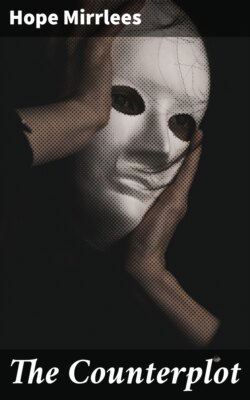Читать книгу The Counterplot - Hope Mirrlees - Страница 6
На сайте Литреса книга снята с продажи.
3
ОглавлениеTable of Contents
The Doña considered that no sand-dune, Turkish divan, bank whereon the wild thyme blows, or Patriarch’s bosom, could rival her own fragrant-sheeted, box-spring-mattressed, eiderdowned bed; therefore she went there early and lay there late. So on leaving the nursery, although it was barely half-past nine, she went straight to bed, and there she was soon established, her face smeared with Crême Simon, with a Spanish novel lying open on the quilt. But the comfort of beds, as of all other things—even though they be ponderable and made of wood and iron—is subject to the capricious tyranny of dreams; and for some time, in spite of the skill of Mr. Heal, the Doña’s bed had not been entirely compact of roses.
When, an hour or so later, Dick climbed into his bed, she said, “I suppose you realise that Harry has forgotten all about my Pepa?”
“Oh, nonsense, Anna! Poor chap, you don’t expect him to be always whimpering, do you? I tell you, the English aren’t demonstrative.”
“Nor are the Spaniards, but they have a great deal of heart all the same; and Harry has absolutely none—I don’t believe he has any soul either.”
“So much the better then; he can’t be damned.”
This was an unusually acute and spiteful remark—for Dick. The Doña had never confided to him her vicarious terrors touching the apostasy of Pepa, who had not had her children baptised, and, during her last illness, had refused to the end the ministrations of Holy Church; but one cannot pass many years in close physical intimacy with another person without getting an inkling, though it be only subconsciously, of that person’s secret thoughts; and though Dick had never consciously registered his knowledge of the Doña’s, the above remark had been made with intention to wound.
His irritation at her criticism of Harry was caused by a sense of personal guilt: twice, perhaps, during the last year had his own thoughts dwelt spontaneously upon Pepa—certainly not oftener.
With a sigh of relief he put out the light, shook himself into a comfortable position, and then got into the shadowy yacht in which every night he sailed towards his dreams. With that tenderness of males (which deserves the attention of the Freudians) towards any vehicle—be it horse, camel, motor-car, or ship—he knew and loved every detail of her equipment; and in the improvements which, from time to time, he made in her he observed a rigid realism—never, for instance, making them unless they were justified by the actual state of his bank-book. The only concession that he made to pure fancy was that there was no wife and children to be considered in making his budget. On the strength of an unexpected dividend, he had recently had her fitted out with a wireless installation. The only guests were his life-long friend, Hugh Mallam, and a pretty, though shadowy and somewhat Protean, young woman.
As to the Doña, she lay for hours staring with wide eyes at the darkness. Why, oh why, had she married a Protestant? Just to annoy her too vigilant aunts, for the sake of novelty and excitement she had, in spite of her confessor, run off with a round-faced, unromantic young Englishman—really unromantic, but for her with the glamour that always hangs round hereditary enemies. Perhaps she deserved to be punished: but when they had been little she had been so sure of her children—how could they ever be anything but her own creatures, pliable to her touch? Even Arnold, brought up a Protestant (he had been born before the Bull exacting that all children of a mixed marriage should be Catholics), she had been certain that, once his own master, he would come over. She smiled as she remembered how he used to say when he was at school—as a joke—“Oh, yes, I’m going to be the Pope, and I’ll have a special issue of stamps to be used in the Vatican, then after a few days suppress ’em; so I’ll have a corner in them!” And though he had not come over to Rome, there was a certain relaxing of tension as she thought of him; somehow or other, it made it different his having been born before the Bull. But Pepa—that was another thing: a member of the Catholic fold from her infancy ... where could she be now but in that portion of Purgatory which is outside the sphere of influence of prayers and masses, and which will one day be known as Hell? Before her passed a series of realistic pictures of those torments, imprinted on her imagination during las semanas de los ejerjicios espirituales of her girlhood.
Could it be?... No, it was impossible.... Impossible? Pepa had died in mortal sin ... she was there.
